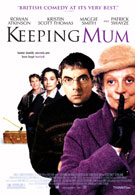A black comedy with very little bite, Niall Johnson’s Keeping Mum boasts a charming cast and a devilish premise that never quite delivers anything more than the occasional chuckle. For all the talent involved, the end result is but a trifle, an unassuming little folly as quaint as the idyllic English countryside in which it’s set. Plagued by languid pacing and a script too timid for its subject matter, the film tries to be subversive but just ends up being cute, and that’s its kiss of death.
Death ends up playing a prominent role in Keeping Mum, as we’re introduced in a brief prologue to young Rosie Jones (Emilia Fox), an expectant mother traveling by train with the dismembered bodies of her husband and his mistress stuffed in a large trunk in the luggage compartment. Her crime is soon discovered, she confesses rather matter-of-factly as if she had no choice in the matter, and is quickly sentenced to a home for the criminally insane.
The story then flashes forward 43 years to the tiny village of Little Wallop, where the kindly but dull Rev. Walter Goodfellow (a restrained Rowan Atkinson) presides over a dwindling congregation and an increasingly dysfunctional family. Sexually frustrated wife Gloria (Kristin Scott Thomas) seeks solace in the arms of her hunky American golf instructor Lance (Patrick Swayze), son Petey is constantly harassed by bullies at school, and leggy teenage daughter Holly is giving new meaning to the word promiscuity, hopping and schtupping like a rabbit from one willing boyfriend to another.
Into the fracas walks Grace Hawkins, the new housekeeper, a model of decorum and matronly wisdom played by the venerable Maggie Smith. Grace’s one possession just happens to be an enormous and eerily familiar old trunk, and soon the family’s problems start to disappear, along with some of the more troublesome residents of Little Wallop. Described as “Scary Poppins” in the film’s production notes, Dame Maggie is as equally comfortable dispensing sweet words of advice and encouragement to Walter and kin as she is dispensing bloody vigilante justice on anyone posing the slightest threat or even nuisance to the family.
Desperately searching for the “perfect home and perfect family” that eluded her, she becomes something of an avenging angel, a lethal instrument of God’s will intent on removing any obstacles that threaten to tear the fragile family apart. Sounds like a thriller, but it’s a surprisingly tame and well-mannered affair that fails to capitalize on its intriguing setup. Thinly drawn characters that fail to engender much sympathy combined with a dearth of any real laughs make this a harmless but ultimately pointless exercise.
The talented cast does its best to inject some life into the pedestrian script, elevating it from hopelessly inert to mildly entertaining. Kristin Scott Thomas has the market cornered on frustration, alienation, and paralyzing ennui – she’s just as convincing with this comic depiction of the neglected spouse as she was in a more dramatic role from earlier in the year (Chromophobia, not yet released in the States). Rowan Atkinson tones it down considerably from his Mr. Bean and Blackadder days, and is quietly effective as the bumbling and distracted vicar who finds his courage and his voice with a little urging from Grace. Swayze gamely mocks his matinee idol status by playing a shallow, slightly lecherous ladies’ man, but too often he overplays it to the point of caricature.
Dame Maggie shines with a few choice lines, the best of which features prominently in the film’s trailer: when Gloria suggests that she can’t just kill people because she disapproves of them, Grace replies nonchalantly, “That’s what my doctors kept saying. It was the one thing we could never agree on.” Now that’s good stuff, but it remains in disappointingly short supply throughout the rest of the picture. I must confess that I find this kind of review by far the most difficult to write. It concerns a well-acted, competently produced film with no obvious shortcomings that utterly fails to engage its audience (in this case, yours truly) on any significant level. To call it a pleasant diversion would be to damn it with faint praise, but that’s about all I can muster for Killing Mum. And for me, that’s simply not enough.
While We Wait For Iman Vellani’s Ms. Marvel Return, I’m Jazzed She’s Joining An Upcoming Movie’s All-Star Cast That Includes Seth Rogen, Woody Harrelson And More
Tom Cruise, Simon Pegg, And Hayley Atwell's Freezing M:I 8 Shoot Looks Honestly Painful, But I Think One Adorable On Set Perk May Have Made It Worthwhile











